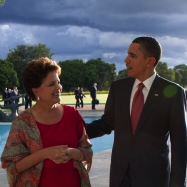Recent developments in South America have upended the United States' historical -- and often misguided -- tendency to lump the region into a one-size-fits-all policy. A politically and economically muscular Brazil, the rise of an anti-American bloc of countries led by Venezuela, and the emergence of economic and even political extraregional rivals in the hemisphere have created a more diverse, independent and contentious region for the United States.
At the same time, the looming shadow of a double-dip U.S. recession and the spectacle of partisan intransigence leaving Washington paralyzed have led to an overwhelming impression across the region that the U.S. is broken and in decline, economically and politically. Combined with the fact that the past two administrations in Washington have often struggled to pay consistent attention to the region and failed to stay ahead of trends, this has led many to declare the end of U.S. influence in the Western Hemisphere.
But the reports of the United States' demise have been greatly exaggerated. Economically and politically, the U.S. remains the leader in what is admittedly a much-changed, more assertive region. What is now necessary, however, is a long-overdue rethink of U.S. policy toward South America.

